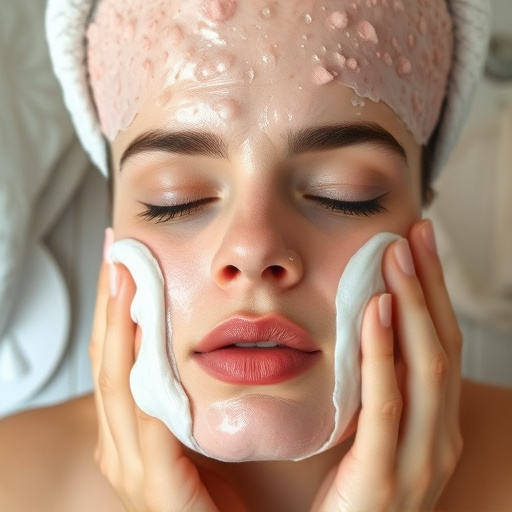The integration of Artificial Intelligence (AI) into medical grade skincare is a game-changer in the beauty industry, offering personalized treatments with unprecedented precision. AI algorithms analyze dermatological data to predict and address skin concerns like hyperpigmentation, acne scars, and fine lines, empowering dermatologists to provide tailored solutions. This technology facilitates advanced skin analysis and customized routines, transforming one-size-fits-all skincare into bespoke medical-grade approaches that cater to unique aesthetic goals while emphasizing the importance of ethical considerations for responsible development.
The future of medical grade skincare is here, driven by the integration of artificial intelligence (AI) and dermatologist expertise. This innovative approach promises personalized treatments tailored to individual skin needs, revolutionizing patient care. By harnessing AI’s predictive power and dermatologists’ clinical knowledge, we unlock new frontiers in skincare. This article explores the rise of AI in medical skincare, the collaborative efforts between dermatologists and AI, and delves into the benefits and ethical considerations shaping this transformative field.
- The Rise of AI in Medical Skincare: Unlocking Personalized Treatments
- How Dermatologists Collaborate with AI for Enhanced Patient Care
- Benefits and Ethical Considerations: Shaping the Future of AI-Assisted Skincare
The Rise of AI in Medical Skincare: Unlocking Personalized Treatments

The integration of Artificial Intelligence (AI) into medical grade skincare marks a significant shift in the beauty and wellness industry. AI algorithms are revolutionizing personalized aesthetic treatments, offering unprecedented precision and tailored solutions for various skin concerns. By analyzing vast amounts of dermatological data, these intelligent systems can predict and address specific skin issues, from hyperpigmentation to acne scars and fine lines. This advanced technology empowers dermatologists to unlock a new level of efficacy in their treatments, ensuring optimal results for each patient.
The benefits of AI in medical skincare are multi-faceted. It enables precise skin analysis, allowing for more effective treatment plans that target specific areas, such as pore refinement or skin tightening. With AI’s ability to learn and adapt, personalized routines can be created, catering to individual needs. This tailored approach promises to transform the way we think about beauty, moving away from one-size-fits-all solutions towards a future where medical grade skincare is truly customized for each person’s unique aesthetic goals.
How Dermatologists Collaborate with AI for Enhanced Patient Care

Dermatologists are increasingly collaborating with artificial intelligence (AI) to enhance patient care and deliver tailored medical-grade skincare solutions. By leveraging advanced algorithms, AI systems can analyze vast amounts of patient data, including skin conditions, genetic predispositions, and lifestyle factors, to provide personalized recommendations for skincare routines and treatments. This collaboration allows dermatologists to offer more precise and effective solutions for various skin concerns, from acne treatments to skin tightening procedures.
AI-driven insights enable dermatologists to make informed decisions about the best course of action for each patient. For instance, AI can predict how a patient’s skin might respond to different products or treatments based on historical data and real-time monitoring. This level of personalization ensures that skincare regimens are optimized for individual needs, leading to improved outcomes and increased patient satisfaction in the realm of medical grade skincare.
Benefits and Ethical Considerations: Shaping the Future of AI-Assisted Skincare

The integration of AI technology into medical-grade skincare presents a promising future for personalized and effective beauty solutions. One of the key benefits is the ability to tailor anti-aging treatments, skin brightening regimens, and wrinkle reduction strategies to each individual’s unique needs. By analyzing vast amounts of data and combining it with dermatologist expertise, AI algorithms can identify specific skin concerns and provide customized recommendations, ensuring optimal results. This precision approach could revolutionize skincare routines, making them more efficient and tailored to one’s goals.
However, as we navigate this exciting new landscape, ethical considerations are paramount. Data privacy and security are essential, especially when dealing with sensitive skin information. Additionally, ensuring transparency in AI decision-making processes is crucial to building trust among consumers. Striking a balance between leveraging the power of technology and preserving human oversight will shape the responsible development and adoption of AI-assisted skincare, ultimately leading to safer and more effective medical-grade products and treatments.
The integration of AI into medical grade skincare signifies a new era in personalized treatments, empowering dermatologists to deliver enhanced patient care. By leveraging advanced algorithms and collaborative partnerships, healthcare professionals can now offer tailored solutions that address individual skin concerns more effectively. As the field continues to evolve, ethical considerations remain paramount, ensuring responsible data handling and equitable access to cutting-edge technology. Ultimately, this fusion of AI and dermatological expertise promises a future where medical grade skincare is not just personalized but also profoundly transformative.













